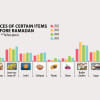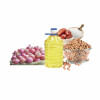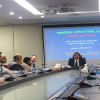Businesses demand zero margin LC for import

Basic commodity importers and traders yesterday demanded the government provide zero margin facility on opening of letters of credit (LCs) for imports of six commodities which will be essential during the upcoming Ramadan.
The six items are onions, edible oil, sugar, lentils, chickpeas and dates.
Businesses made the demand at a meeting with Senior Commerce Secretary Tapan Kanti Ghosh at his secretariat office in Dhaka.
Currently, the LC margin depends on bank-client relationships except in the case import of luxury goods, on which there is a 75 percent to 100 percent margin in place.
However, Ghosh said businessmen in the meeting complained that LC margins as high as 100 percent were being imposed by banks for the import of essential commodities.
This means importers have to deposit 100 percent of their total import payments while opening LCs, which hinders competition among importers.
"We will write a letter to the central bank tomorrow [Thursday] seeking the easing of conditions like LC margin so that the Bangladesh Bank instructs scheduled commercial banks to make adequate dollars available to facilitate the opening of LCs for imports of six essential commodities," Ghosh said.
Senior officials of the National Board of Revenue (NBR), Bangladesh Bank, different ministries, and department of the government and commerce ministry were present at the meeting as Ghosh wanted to know about the stocks and supplies of those six commodities.
Businessmen also said sugar imports were a bit lower as India also stopped exporting sugar, which is why price of sugar is high in the domestic markets. But they added that the LC situation was improving and many had opened LCs to import sugar from Brazil.
After hearing complaints about delays in the release of goods, Ghosh said he would talk with officials of the Chattogram port and customs so that imported commodities are released as quickly as possible.
After the meeting, Ghosh told a group of journalists that the demand for some essential commodities rises ahead and during Ramadan as consumers buy more during this time.
For instance, the monthly demand for sugar in Bangladesh is 1.35 lakh tonnes, but increases to 3 lakh tonnes during the month of Ramadan, according to data from the commerce ministry.
Similarly, the demand for edible oil rises from a monthly average of 1.50 lakh tonnes to 3 lakh tonnes while demand for onions surges from a monthly average of 1.73 lakh tonnes to 5 lakh tonnes.
The demand for other essentials also nearly doubles during Ramadan, Ghosh said, adding that he would write to the NBR to reduce the duty on imports of dates during Ramadan.
Ghosh also added that businessmen had expressed concern about the impasse in the Red Sea, which had been hindering the shipment of goods, saying it may affect the price level of basic commodities in the local market.
The holy month of fasting for Muslims will begin in the second week of March this year.
Representatives from different trade bodies like the Federation of Bangladesh Chambers of Commerce and Industry (FBCCI) and executives from different essential manufacturing companies also participated in the meeting.

 For all latest news, follow The Daily Star's Google News channel.
For all latest news, follow The Daily Star's Google News channel. 







Comments